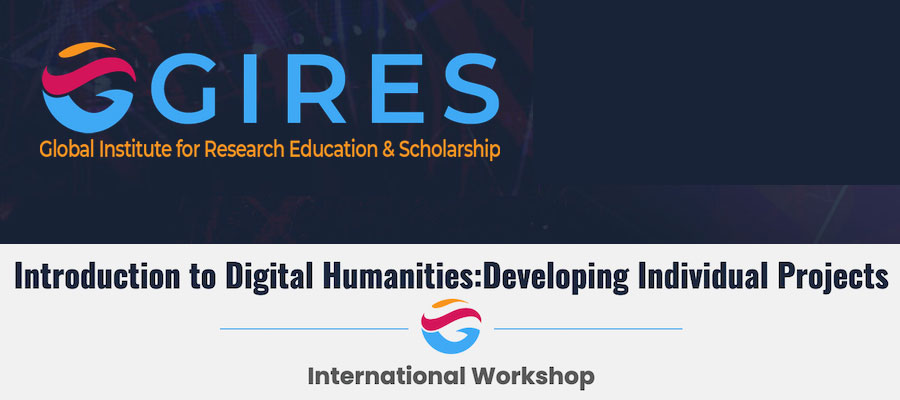Introduction to Digital Humanities: Developing Individual Projects, Global Institute for Research, Education and Scholarship, Online, March 10, 17, 24, 31, April 7, 5 pm (Amsterdam, UTC +2)
GIRES, the Global Institute for Research, Education and Scholarship and the Oral History & Digital Humanities Academy (ODA), committed to support the endeavors of global scholarly community, offer a new workshop for those who wish to enter and explore the fascinating world of Digital Humanities (DH) under the guidance of expert Dr. Rada Varga.
This workshop series addresses humanists and social sciences students or researchers interested in acquiring technical skills directly useful for their research. Digital humanities offer the possibility to go into deeper and more efficient interdisciplinary research, as well as it helps one look at its data from a different angle. Furthermore, undertaking a DH training helps humanists develop computational thinking and increases computer literacy – two sets of skills which become more paramount by the day.
The workshops will be taught both asynchronously and synchronously, with three envisioned steps:
- Pre-recorded lectures and tutorials for each topic; their approximate duration will be 1 hour, generally fragmented in 2-3 parts;
- Exercises based on these tutorials, which are also to be allocated an approximate 1-hour duration;
- On-line, synchronous, meeting, where we will discuss the exercises and any other connected problems the attendees might raise; their duration will be 1-2 hours.
The sessions will imply individual exercises, team exercises, as well as discussions and individual and group feedback. Given the nature of the course, we will unavoidably use Open Educational Resources (OER) and a blended learning system. The participants will be encouraged to use their own datasets, so that the results are both familiar and relevant, but in case of need we will have sample spreadsheets to offer them. Regarding the employed software, we will use open access programs and platforms.
Each workshops is a stand-alone, but the participants who would attend all of them will basically graduate from a complete introduction to DH course.
WORKSHOPS
Data structuring & Databases (March 10th, 5pm CET)
The session will focus on structuring any kind of data (but especially narrative) into a tabular form, as well as on interrogating and identifying the information within structured datasets (spreadsheets, tables). The most accessible data structuring formats will be presented (Excel, .csv).
Gained abilities:
- Extracting information from a text in tabular form;
- Excel basics
- Building a database in Airtable
Visualization (March 17th, 5pm CET)
The session will come as a critical analysis of the role of visualization in humanities and social sciences and as an introduction into the most employed visualizing platforms: Tableau Public, Raw Graphs.
Gained abilities:
- Understanding the theory of visualisation (why? when? how much is too much?);
- Visualizations with Raw Graphs;
- The basics of Tableau Public.
Social Network Analyses (March 24th, 5pm CET)
The session will demonstrate how one can achieve scientific insights using their structured data and the platforms presented before. For focusing on network analyses, we will use Gephi.
Gained abilities:
- Understanding what is SNA and why should we use it as a research method;
- Building networks with Gephi.
Geographic annotations & Customizing maps (March 31st, 5pm CET)
The participants will get familiarized with the most common systems of geographic annotation and visualization – Google MyMaps and Geographic Information Systems (GIS), with QGIS, the associated platform.
Gained abilities:
- Constructing interactive maps with Google MyMaps;
- Geographic annotations with QGis and exporting layers in ArcGIS.
Linked open data and on-line for humanists (April 7th, 5pm CET)
The session will focus on online tools generally useful for humanists, as well as on useful concepts, which facilitate online research and interaction in scientific contexts.
Gained abilities:
- Using Wikimedia commons in humanist research;
- Understanding the notions of Linked Open Data and copyright issues in humanist research.
Registration Deadline
The registration deadline for each workshop is the preceding Saturday (before the course on Thursday). Maximum number of participants per worksop is 20.
Registration Fees
Early Bird: 129 euros (All Sessions). Available until until 25 February 2022
Regular: 149 euros (All Sessions). After 25 February 2022
Single Session: 40 euros.
